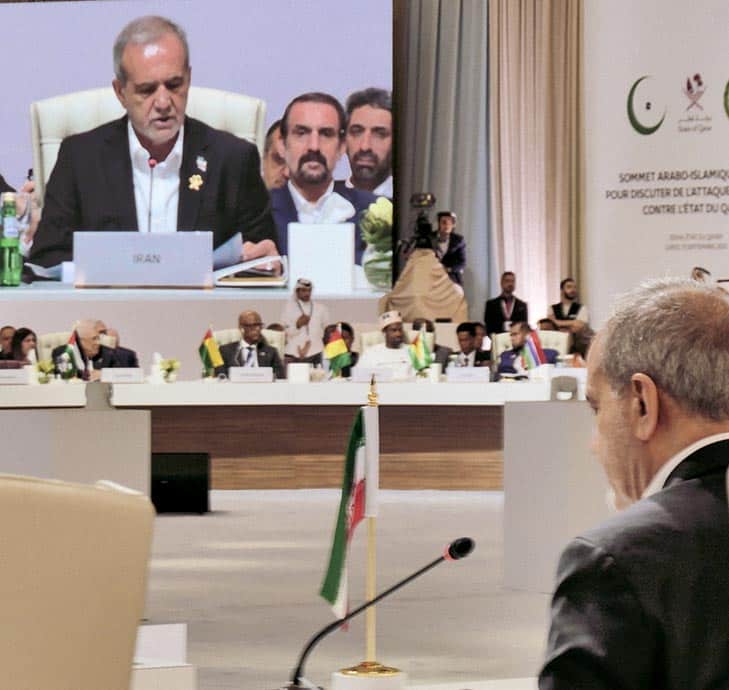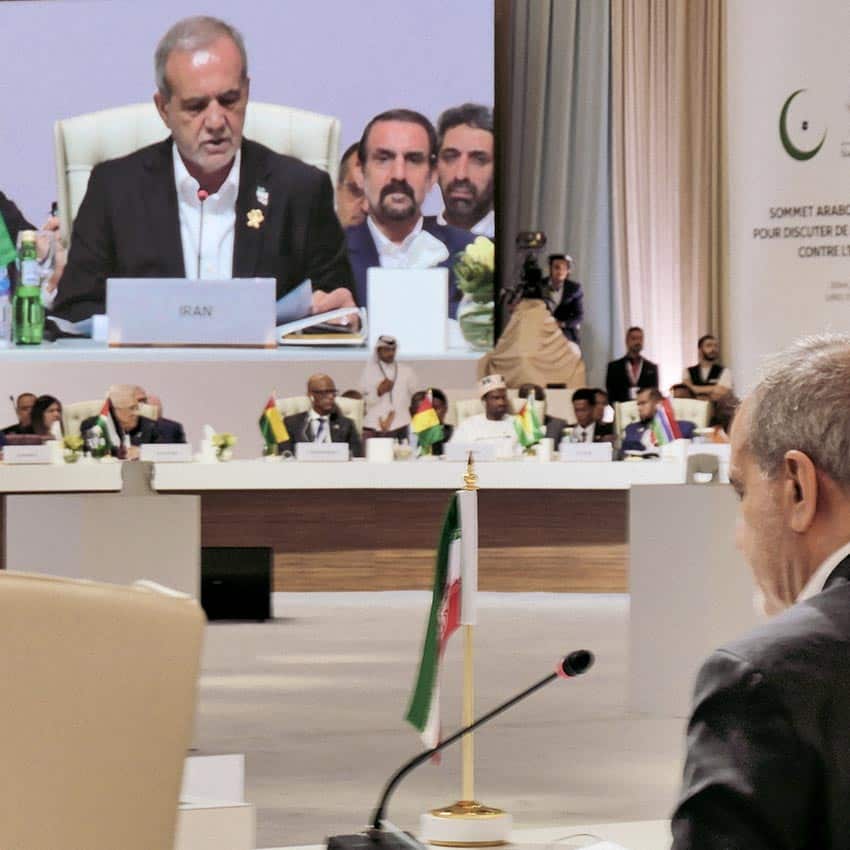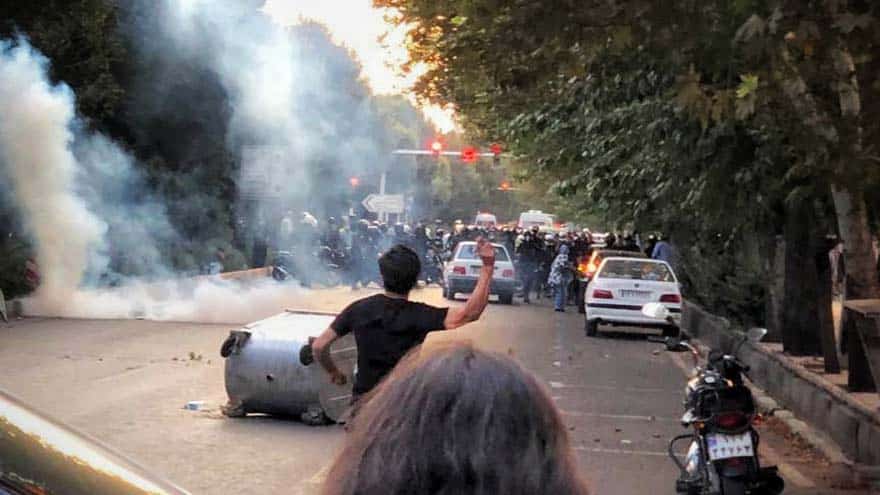On September 15, an emergency Arab-Islamic summit was held in Doha in response to “Operation Summit of Fire” — the Israeli strike on Hamas’s foreign bureau in the Qatari capital a week earlier. Even before the summit officially opened, a preparatory meeting of foreign ministers took place in the city, during which participants agreed on the draft of the final communiqué. The document reflected the Arab-Islamic collective’s inability to unite around operative, “toothy” decisions against Israel. Faced with divisions and conflicting positions among the participants, the summit’s attendees settled for adopting empty and bombastic rhetoric devoid of any practical or actionable substance.
The emergency summit in Doha was attended by leaders and senior officials from 57 countries, among whom stood out the representatives of the four Arab states bordering Israel: Egyptian President Abdel Fattah el-Sisi, Jordan’s King Abdullah II, Syrian President Bashar al-Assad, and Lebanese President Joseph Aoun. Other prominent participants included Palestinian Authority President Mahmoud Abbas, Saudi Crown Prince Mohammed bin Salman, and the host, Qatar’s Emir Sheikh Tamim bin Hamad Al Thani.
Among the leaders of Muslim states, notable attendees included Turkish President Recep Tayyip Erdoğan and Iranian President Masoud Pezeshkian, whose country had attacked the American Al-Udeid base in Qatar in June this year in response to strikes on its nuclear facilities. Absent from the summit discussions were the leaders of the United Arab Emirates, Tunisia, Algeria, Kuwait, Morocco, Bahrain, and Oman.
The absence of UAE President Mohammed bin Zayed warrants special attention, given that September 15 marked the fifth anniversary of the signing of the Abraham Accords — the normalization agreements between Israel and the UAE, Bahrain, and Morocco. Recently, even before the Israeli strike in Doha, the Emiratis had shown a more cautious stance toward Israel, publicly warning that the annexation of territories in the West Bank constituted a “red line” that would gravely undermine the spirit of the Abraham Accords. It is worth recalling that bin Zayed was the first leader to arrive in Qatar the day after the Israeli strike, heading a high-level delegation. This move resonated throughout the Arab world and was widely perceived as a warning signal to Israel.
Before the summit convened, following the Israeli Air Force strike, Hamas issued a statement clarifying that the organization’s senior officials — foremost among them Khalil al-Hayya, who serves as Hamas’s negotiator in indirect talks with Israel over a new ceasefire and hostage release deal — were not killed in the attack. It is worth noting that, so far, Hamas has not released any photographs of al-Hayya or other senior leaders, leaving it unclear whether they were injured at all and, if so, to what extent. Nevertheless, several of them have since appeared in media interviews. In another statement, Hamas claimed that the Israeli strike had failed. However, it admitted that five lower-ranking operatives — including al-Hayya’s son, his chief of staff, and three others — were killed in the attack. Qatar’s Interior Ministry reported that a local security officer was also killed in the Israeli strike.
According to statements made by senior Hamas officials to the media, the Israeli strike occurred while the organization’s top leadership was convened at the Doha headquarters to discuss a new American proposal submitted by U.S. President Donald Trump. His proposal called for the release of all hostages on the first day of the ceasefire and included guarantees for subsequent negotiations to end the war.
“Israeli Influence Over the Region – A Dangerous Illusion”
In the speeches delivered by the leaders participating in the summit, statements were heard emphasizing solidarity with Qatar following the IDF strike in the capital city, as well as calls to hold Israel accountable and to end its “aggression” against Hamas in the Gaza Strip. Qatar’s Emir, Sheikh Tamim bin Hamad Al Thani, accused Israel of seeking primarily to sabotage negotiations with Hamas regarding the hostages and a ceasefire, warning that Prime Minister Benjamin Netanyahu “dreams of turning the Arab world into an Israeli sphere of influence — a dangerous illusion.” The Emir further stressed that Qatar is determined to do whatever is necessary to defend its sovereignty and curb Israel’s aggression.
Egyptian President Abdel Fattah el-Sisi emphasized in his speech that Israel’s actions are undermining the peace agreements signed between it and the Arab states in the region, warning that “what is happening now delays the future of peace, threatens Israel’s security and that of other countries in the region, and hampers the prospects for new peace accords.” This statement by el-Sisi followed his recent inflammatory remarks against Israel, which appeared in the Egyptian media. His comments reflect the concern among authorities in Cairo that Israel may, at some stage, attempt to target leaders of Palestinian organizations currently residing in Egypt.
The Secretary-General of the Arab League, Ahmed Aboul Gheit, described the Israeli strike in Doha as an operation that “crosses all boundaries.” He stressed that the purpose of the summit was not only to express Arab-Islamic solidarity with Qatar but also to send a clear message to the international community that “silence can no longer be tolerated in the face of the actions of a state intent on igniting the region.” From his perspective, Aboul Gheit added, the attack in Doha was “a vile and cowardly act,” and Israel’s boasting about it reflected a moral decline on its part. He concluded that “silence in the face of such crimes is itself a crime.”
Palestinian Authority President Mahmoud Abbas repeated in his speech at the summit his long-standing appeal to the international community to take practical steps to restrain Israel or at least limit its actions.
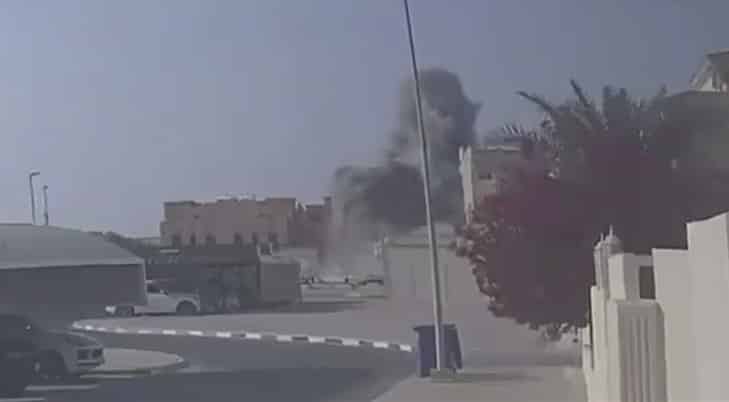
Gulf States Close Ranks
The summit’s final communiqué placed full responsibility on Israel for the escalation in the region and criticized the international community for failing to take tangible punitive measures against it. The participants expressed total solidarity with Qatar and called for diplomatic steps to restrain Israel. Regarding the Palestinian issue, the communiqué emphasized the need to end the war in the Gaza Strip, develop reconstruction plans, and warned of the dangers inherent in Israel’s potential extension of sovereignty over territories in the West Bank.
However, as noted, the communiqué refrained from addressing concrete steps against Israel, even as it displayed unequivocal alignment with Qatar. It reflected the prevailing mood and sentiments within the Arab-Islamic system against Israel, describing the strike as “cowardly and illegal,” a blatant act of aggression against an Arab and Muslim state, a gross violation of Qatar’s sovereignty, and a serious threat to regional peace and security.
The communiqué further reaffirmed the summit’s adoption of the “New York Declaration,” passed by the UN General Assembly, which supports the two-state solution and the establishment of an independent Palestinian state within the borders of June 4, 1967, with East Jerusalem as its capital. The Arab leaders who gathered in Qatar welcomed the upcoming international conference on the Palestinian issue, led by France and Saudi Arabia, and reiterated that the Al-Aqsa Mosque is a place of worship exclusively for Muslims, while expressing support for Hashemite custodianship over its administration.
Before the final communiqué was issued, during the summit, the leaders of the Gulf states issued a joint statement instructing the Gulf Cooperation Council’s Defense and Security Council to convene urgently in Doha following Israel’s strike. The statement also called for the activation of the collective defense mechanism among GCC member states. According to the GCC Charter, which encompasses the six Gulf countries, any attack or threat against one member state is considered an attack or threat against all. This understanding enables joint coordination to defend regional security and promote stability. The GCC’s collective defense mechanism includes intelligence sharing, military exercises, and, if necessary, the deployment of joint forces.
However, according to reports from Arab sources, the statement was largely symbolic and did not indicate any immediate or practical measures.
Media assessments suggested that, under the current circumstances, the Gulf states’ declaration reflected a desire to unify political positions amid regional tensions without yet taking concrete military action. The statement also emphasized that the GCC Defense and Security Council viewed the attack in Qatar as an act that undermined the country’s efforts to mediate a ceasefire and the release of Israeli hostages held by Hamas in Gaza, as well as Palestinian prisoners.
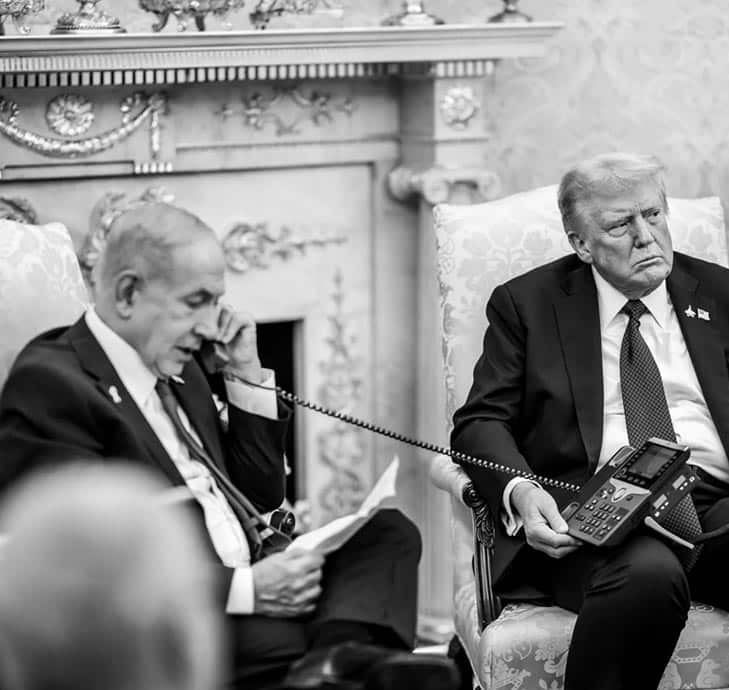
Worrisome Signals from Egypt
Following the remarks of President el-Sisi mentioned above, it is worth recalling that recent reports in the Arab media stated that, after the attack in Doha, Egypt decided to scale back its coordination ties with Israel until further notice. The same reports claimed that Egypt is considering the possibility of changing the framework of its relations with Israel, particularly those in the military and security channels between the two countries. Conversely, Israeli media reported that no such Egyptian decision is known to exist. They clarified that “Egyptian sources familiar with the relations between the two states” denied these reports, emphasizing that “security and intelligence cooperation between them continues as usual.”
Egypt was among the first countries to condemn the Israeli strike in Doha. In a statement issued by the Egyptian Foreign Ministry following the attack, Cairo declared that it “calls on the international community to assume its legal and moral responsibility regarding this blatant violation, to take immediate action to stop Israeli aggression, and to demand accountability from those responsible so that Israel will no longer evade justice.” The statement further asserted that the incident constituted an “escalation that undermines international efforts aimed at de-escalation and poses a threat to regional security and stability.”
Cairo’s attitude toward the entire event was also reflected in a Wall Street Journal report, which revealed that Egyptian officials were among those who warned senior Hamas figures in Qatar of a possible Israeli strike and advised them to strengthen their security arrangements.
In conclusion, the emergency summit convened in Doha expressed — through the speeches of participating leaders and its final communiqué — as expected, the Arab-Islamic collective’s alignment with Qatar following the Israeli attack on Hamas’s foreign bureau and its sharp criticism of Israel’s ongoing campaign against the terror organization in the Gaza Strip. Beyond the statements, the outcomes of the summit may serve as a test case for the ability of Arab and Islamic states to translate their support for Qatar and their solidarity in the wake of the Israeli strike into practical measures. In this regard, it can be stated unequivocally that despite the anger and frustration prevalent among the summit participants, the existing divisions and differences in their positions constitute a significant — almost insurmountable — obstacle preventing them from agreeing on any operative decision to take active measures against Israel.
Looking ahead, beyond the convening of the summit, it remains unclear what impact the Israeli strike will have on Qatar’s renewed efforts to promote a new deal regarding the release of hostages and a ceasefire. The prevailing impression is that continued Qatari involvement remains a realistic scenario. In any case, given the current strain in relations between Israel and the emirate, Jerusalem may consider an alternative option — favoring Egypt as the primary mediator with Hamas for the formulation of a new deal, while distancing itself from Qatar due to its consistent alignment with Hamas and its long-standing financial support for the organization.
